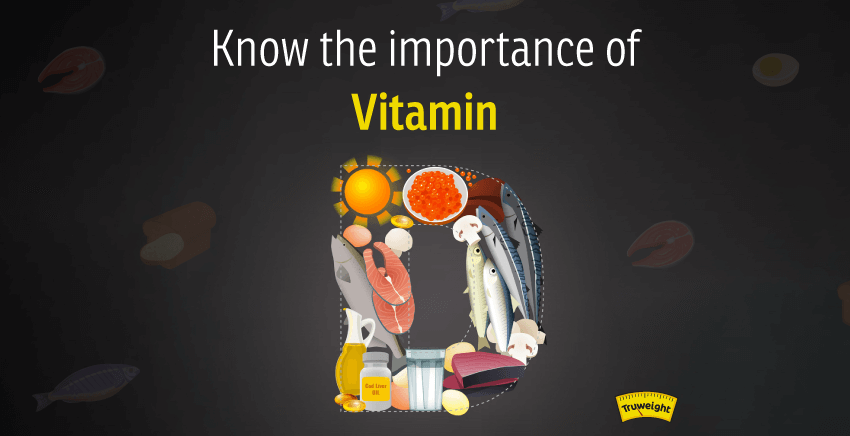Food & Nutrition, Health, Lifestyle, Nutrition
Vitamin D: It’s Importance, Sources And How To Tackle The ‘D’ Deficiency
Medical Reviewed by Dr. Shanmukha Priya, M.Phil and Ph.D. in Food Science and Nutrition
For healthy and strong bones, it is very important to have enough Vitamin D in the body. Vitamin D is a fat-soluble vitamin helps the body to absorb calcium and protects bones from turning brittle. It also plays a vital role in boosting the body’s immune system.
Though Vitamin D can naturally be obtained from sunlight, still, Vitamin D deficiency is quite prevalent across the world.
In India, nearly 90% of the population has vitamin D deficiency and lack of Vitamin D leads to cardiovascular diseases, sclerosis, autoimmune diseases, tuberculosis and even cancer.
Of course, too much of Vitamin D can lead to vitamin D toxicity which can cause side effects like nausea, frequent urination and weakness. Therefore it is important to maintain a healthy balance when it comes to vitamin D. [1]
Table of content
- What is Vitamin D?
- The need for Vitamin D
- The caretaker of bones and muscles
- Vitamin D for preventing Osteoporosis
- Vitamin D and obesity
- Role of Vitamin D in elderly people
- The reverse effect
- Effect of the D-deficiency in the body
- Vitamin D deficiency in India
- Reasons for Vitamin D deficiency
- Source of Vitamin D
- Sunlight as a source of Vitamin D
- Food source of Vitamin D
- Vitamin D toxicity
What is Vitamin D?
Vitamin D, popularly called as ‘sunshine vitamin’, can be made by our skin when exposed to the sunlight. There are two forms of Vitamin D – Vitamin D2 (ergocalciferol) and Vitamin D3 (cholecalciferol).

Vitamin D2 is naturally found in mushrooms that are exposed to the sun. The human skin synthesises Vitamin D3 when the UVB from the sun touches the skin. Therefore this is considered the most ‘natural’ way of getting Vitamin D. Apart from sunlight, certain foods also have vitamin D which falls under the Vitamin D2 category.
Vitamin D2 that is ingested via food and D3 that is produced by the sun is then converted to the active form – 1,25-dihydroxyvitamin D [1,25(OH)2D] in the human body.
Well, why do we give so much importance to Vitamin D?
This is because Vitamin D is very crucial for the absorption of phosphorus and calcium. With the absence of Vitamin D, only 60% of phosphorous and 10 to 15% of calcium is absorbed.
On the other hand, a person who has a sufficient amount of Vitamin D can absorb 80% of phosphorous and 30 to 40% of calcium. [2]
The need for Vitamin D
Since it helps absorb calcium, Vitamin D plays a vital role in building bones and keeping it healthy and strong. Vitamin D also stops the parathyroid hormone from releasing. This hormone has the ability to reabsorb the bone tissues making it brittle and thin.
Apart from this, Vitamin D boosts the immune system and muscle function. Body’s immune system builds a defence system against illness and infections. Similarly, studies have indicated that consuming Vitamin D has reduced the dangers of elderly people falling down.
Few studies have suggested that sufficient Vitamin D might help in preventing certain cancers like breast, prostate and colon. Additionally, few types of research indicated that sufficient Vitamin D can also prevent and help treat diseases like high blood pressure, heart disease, multiple sclerosis and diabetes.
Nevertheless, the outcomes of these studies are still under debate. It is also important to note that the amount of Vitamin D that can be taken is still under research.[3]
Vitamin D – the caretaker of bones and muscles
A research article published by Harvard noted that studies indicate insufficient Vitamin D levels can up the risk of fractures especially among the older adults and consuming Vitamin D supplements can prevent this.
The studies mentioned arrived at this conclusion after conducting trials on 40,000 elderly women.
The outcome revealed that non-spine and hip fractures were reduced by 20% when Vitamin D supplements were taken in higher quantity. When the intake was less, there were no significant fracture-prevention benefits.
Vitamin D for preventing Osteoporosis
Several studies have linked Vitamin D and osteoporosis – a bone disease that is quite common across the world. When Vitamin D is low, there are high chances that the person might be affected by osteoporosis.
This is because the absorption of calcium will decrease when the body is low on Vitamin D and adequate calcium is very important for bone health.
A study published by JABFM noted that supplements that had both Vitamin D and calcium improved bone mineral density and reduced the risk of hip fractures. However, the results weren’t clear on using Vitamin D supplements alone for bone health.
Similarly, a Cochrane review also observed that the effects of Vitamin D supplements alone on vertebral, hip and other fractures were unclear but backed the combined use of calcium and Vitamin D, especially among the elderly. [4]
Vitamin D and obesity
Several studies have confirmed that there is an association between Vitamin D deficiency and obesity.
Research papers published in the past have indicated that lower levels of Vitamin D are linked to higher body mass index (BMI) and the concentration of PTH (parathyroid hormone).
It was also observed that obese people require more dosage of Vitamin D to treat the deficiency compared to the rest of the population.
However, the mechanism behind obesity and lower level of 25D concentrations is not fully explained and the health consequences of this remain uncertain. [12]
Role of Vitamin D in elderly people
Since Vitamin D improves bone and muscle strength, it also plays an important role in elderly patients who tend to fall down.
Several studies have indicated that Vitamin D supplements have the ability to reduce the risk of elderly people falling down. This is because increased Vitamin D levels improve muscle function and strengthen it.

A study conducted in Australia evaluated elderly women who had experienced a fall in the previous 12 months. The participants were given 1000 mg of calcium per day and asked to either take a placebo or a Vitamin D supplement of 1000 IU a day. The study noted that the participants who had taken the supplement demonstrated a significantly reduced risk of falling down.
Similarly, in another study, 1237 elderly men and women were given Vitamin D supplements for two months to three years. The collective results demonstrated a reduction of 22% in falling risk when given Vitamin D while compared to calcium alone or placebo.
Both studies noted that taking a dose of 800 IU or more of Vitamin D per day reduced the dangers of falling down significantly when compared to placebo or lower dose of Vitamin D.
The reverse effect
While Vitamin D generally strengthens the bones and muscles and improves calcium, a study unexpectedly found out that taking an excessive dose of Vitamin D actually upped the risk of falling down and fractures in elderly women.
The study’s participants were given a dose of 500,000 IU in a once-a-year tablet. After five years of follow-up, women who had taken the Vitamin D supplement demonstrated an increased 15% and 26% fall and fracture risk respectively when compared with women who were given the only placebo.
The authors concluded that taking a single large dose of Vitamin D instead of several doses distributed throughout the year increased the risks. Another study similar to this also yielded the same results. [5]
Effect of The D-deficiency in the body
Vitamin D deficiency can lead to bone diseases other diseases to several medical conditions, including diabetes, high blood pressure, cancer, and autoimmune conditions such as multiple sclerosis
Children, young and middle-aged adults are at risk of acquiring Vitamin D deficiency. One of the main reasons for Vitamin D deficiency is a lack of exposure to sunlight.
In countries like South America, the Middle East, Africa, India and Australia, Vitamin D deficiency is quite common.
Symptoms of Vitamin D deficiency include muscle pain, back pain, tiredness, bone loss etc.
From ensuring proper function of the immune system to reducing the risk of cardiovascular diseases, Vitamin D is much needed for the overall well being and not just for bone and muscle health.
Below are some of the health issues faced by people who are Vitamin D deficient.
1. Skeletal health
Vitamin D deficiency is known to cause rickets – a skeletal disorder among children. Vitamin D deficiency causes an imbalance between phosphorous and calcium in bones resulting in skeletal deformity, bone pain and muscle weakness.
Among the adults, inadequate Vitamin D results in poor calcium absorption from the diet and increases the calcium resorption from kidney and bones. This reduces the mineral density of the bones resulting in osteomalacia and osteoporosis.
2. Prone to infectious diseases
Studies have noted that people with Vitamin D deficiency have infectious diseases like influenza and tuberculosis.
3. A danger to heart
Framingham Heart Study reported that patients with a very low concentration of Vitamin D had a 60% higher chances of developing heart diseases compared to people who have sufficient Vitamin D.
4. Can cause autoimmune-diseases
Vitamin D is important for the regulation of the immune system, cell differentiation and development. A case-control study observed that children with Type 1 diabetes had a higher deficiency of Vitamin than non-diabetic children.
It was also noted that taking Vitamin D supplements lowered the risk of Type 1 diabetes by 30%. It is noteworthy that Vitamin D deficiency is also linked to rheumatoid arthritis.
5. Vitamin D’s role in Parkinson’s disease
Studies noted insufficient Vitamin D in people with Parkinson’s disease since Vitamin D receptor is a genetic risk factor for Parkinson’s disease.
The good news is, the status of Vitamin D can be modified and it has the potential to prevent the disorder. However, more research is needed to confirm the association of Vitamin D receptor and the concentration of Vitamin D in Parkinson’s disease.
6. Depression and suicide
An article published by NCBI noted that people with Vitamin D deficiency took a longer period of time to recover from depression when compared to their non-deficient counterpart.
Similarly, Vitamin D deficiency is also associated with suicide.[6]
7. Type 2 diabetes
Deficiency of Vitamin D is linked to the increased risk of insulin resistance, insulin production and Type 2 diabetes.
A study conducted on non-diabetic people aged over 65 years noted that those who had taken Vitamin D supplements reported a lower rise in their fasting glucose level while compared to people who were given placebo.
Evidence also suggests that sufficient Vitamin D reduces the risk of Type 2 diabetes.
8. Cancer
Studies have suggested that low concentration of Vitamin D is linked to certain cancers like lung, prostate, esophagus, pancreas, ovarian, breast and colorectal.
Evidence has suggested that Vitamin D bars new blood vessels from growing and has anti-inflammatory effects. [14]
9. Multiple sclerosis
Several kinds of research have indicated that a sufficient amount of Vitamin D, getting enough sun exposure and eating Vitamin D rich foods might lower the chances of multiple sclerosis in a person. In fact, Vitamin D supplements can modify the risk factors of multiple sclerosis. Studies also suggest that Vitamin D can benefit people who have already developed multiple sclerosis. However, the research is inconclusive.
Though Vitamin D supplements seem to be quite safe for multiple sclerosis, high dosage of Vitamin D can meddle with the calcium levels and more research needs to be done to arrive at a conclusion.[7]
Vitamin D deficiency in India
Studies conducted in India to determine the Vitamin D deficiency reported that there is 50%-94% prevalence in the country. There is only one other study that reported 34.5%. [9]
The studies included people from different age groups.
Some of the reasons for Vitamin D deficiency in India are listed below:
- People who suffer from skin, liver and kidney disorder are likely to be deficient in Vitamin D.
- Pollution hampers Vitamin D synthesis in the skin.
- Consuming a diet that is low in Vitamin D and calcium.
- Phosphates and Phytates in fibre-rich foods have the potential to delete the stored Vitamin D can up the requirement of the calcium.
- Use of sunscreens and an increase in skin pigmentation.
- Covering face owing to religious practices.
Reasons for Vitamin D deficiency
Why does Vitamin D deficiency happen? Here we have listed a few common reasons for Vitamin D deficiency.
- Lack of exposure to sunlight, especially among children and adults.
- Lathering sunscreen with an SPF of 30 dilutes the synthesis of Vitamin D in the skin by 95%.
- Dark-skinned people are naturally protected from the sun. So they need 3 to 5 times more exposure to the sun for absorbing Vitamin D than their fair-skinned counterparts.
- Studies have revealed that obesity can also be a reason for Vitamin D deficiency.
- Bariatric patients and patients who suffer from fat-malabsorption syndrome will not be able to absorb Vitamin D – which is a fat-soluble vitamin.
- Patients who suffer from nephrotic syndrome can lose 25(OH)D which bound to the D vitamin protein in the urine.
- Patients who are under medications for treating HIV/AIDS and anticonvulsants are likely to develop Vitamin D deficiency.
- Patients who suffer from diseases like fungal infection and tuberculosis, certain cancers and hyperparathyroidism are at risk of Vitamin D deficiency. [8]
Source of Vitamin D
Though Vitamin D is a fat-soluble vitamin, it behaves like a hormone. When other vitamins cannot be synthesised and can only be ingested, Vitamin D can be synthesised.
Vitamin D in its active form is called Calcitrol. Its chemical similarities are similar to hormones like cortisol, estrogen and testosterone.
The best source of Vitamin D is the natural sunlight, Vitamin D supplements and diet.
Some of the foods rich in Vitamin D3 are egg yolks, salmon, mushrooms etc. Vitamin D that is in plant form is called ergocalciferol or Vitamin D2. Both Vitamin D3 and D2 can be obtained through fortified foods and Vitamin D supplements.
It is noteworthy that Vitamin D obtained through natural sunlight is a better source than a diet. This is because; one serving of food only provides 40 to 400 IU which is insufficient.
On the other hand, a light-skinned person can get 10,000 IU of Vitamin D just by spending only 20 minutes under the sun. However, this highly depends on sunscreens used, pigmentation of the skin, environmental factors, age etc. [10]
Sunlight as a source of Vitamin D
The best time to get vit. D from sunlight is 11 am to 1 pm (based on a study conducted in Pan India).
The following instructions have to be taken care:
- Clothing minimal.
- 10 to 30 minutes of exposure.
- Three times per week will be sufficient for light-skinned people and for dark-skinned people, expose 4 or 5 times.
- Wear sunglasses to protect the eyes.
- Avoid sunscreen during exposure as it reduces the ability to produce vitamin D.
- After getting exposed to sunlight apply sunscreen.
- Take vitamin D supplements and take vitamin D test once in 6 months.
Food source of Vitamin D
Though certain foods have natural Vitamin D2, generally foods are fortified with Vitamin D to get the maximum benefit.

A handful of studies used fortified dairy products such as yogurt, milk and cheese to observe if these provided at least 10mg of Vitamin D in a day. Researchers noted an increase in the 25(OH)D concentration.
Likewise, ingesting yogurt drink that has 25 mg of Vitamin D3 with no added calcium upped the concentrations of serum 25(OH)D3. Additionally glycaemic status also improved among diabetic patients and studies reported no adverse effects.
Apart from dairy products, studies have backed fortified orange juice and wild mushrooms for the concentration of serum 25(OH)D. Other fortified foods that can boost Vitamin D include eggs, meat, fortified bread, fortified breakfast cereals, chicken, beef and pork.[11]
Vitamin D toxicity
When a person takes a higher dosage of Vitamin D supplements for a longer period of time or is exposed to the sun too much might develop Vitamin D toxicity or otherwise known as Hypervitaminosis D – excessive Vitamin D.
Other than Vitamin D overdose, Hypervitaminosis D can happen due to Vitamin D metabolites. Vitamin D toxicity is usually accompanied by hypercalciuria and hypercalcaemia and undetectable PTH activity.
The symptoms of Vitamin D toxicity are vomiting, dehydration, confusion, abdominal pain, confusion, polydipsia, apathy and polyuria. In the case of Vitamin D toxicity, medical professionals will ask to stop Vitamin D supplements. [13]
Conclusion
Vitamin D can be obtained very easily and that too without burning a hole in your pocket, thanks to the sun.
Despite the readily available source, a staggering number of people across the globe and the majority of the Indian population is suffering from this deficiency.
Though many factors contribute to this condition, lack of awareness and poor lifestyle choices are the main reasons behind the D deficiency.
Soak up the sun – literally! Spend some time outside, especially in the morning sun for at least 20 or 30 minutes. If your skin is pigmented, spend extra time. This is the best source of Vitamin D. Just remember to NOT use sunscreen.
Doing this religiously will prevent bone and muscle-related problems in the long run and will boost your immunity. So embrace the sunshine and ensure your body an adequate Vitamin D. This is definitely a step towards healthier living.
FAQs
Q: What happens if vitamin D is low?
A: People with Vitamin D deficiency are likely to experience muscle pain, back pain, tiredness, bone loss etc.
Q: Which vegetable is high in vitamin D?
A: Mushrooms is the best source of Vitamin D2.
Q: Can a lack of vitamin D cause weight gain?
A: Studies have confirmed that there is a link between Vitamin D deficiency and weight gain.
Q: How to increase vitamin D levels quickly?
A: Spending some quality time in the sun will boost the Vitamin D production in the skin.
Q: How long do you need to sit in the sun for vitamin D?
A: It is ideal to spend at least 20 minutes in the sun, especially in the morning, to boost the Vitamin D production.

Trueweight is literally the BEST weight loss community anywhere, I read it every day, and I’m also so grateful, it helped me not only lose weight but keep it off, hope it helps some others!
Hi! Thank you for your lovely note, We are so gleeful to receive your feedback towards our blog, We are glad to know that our blog was very useful to you. Keep following our blog to know such more health information.